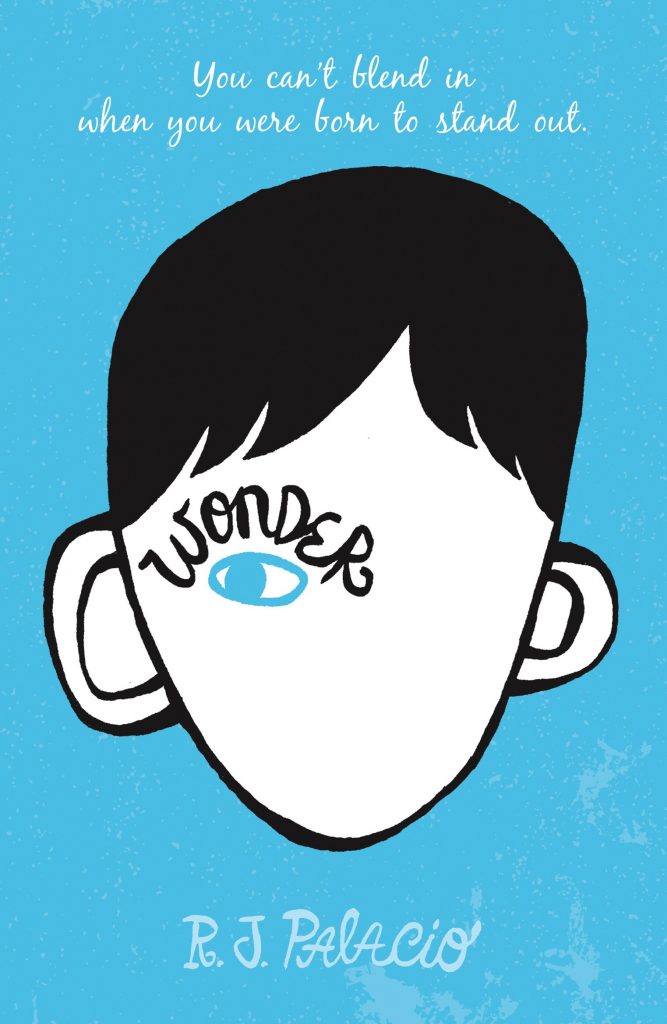Book Review: Wonder
Today’s book review is a departure from the norm for me. If you’ve followed my blog for a while, you’ll know that I semi-regularly post reviews on Bible studies and other books related to spiritual development. But today, I’m writing about Wonder by R.J. Palacio.
This review isn’t intended to be an in-depth look at the literary features that Palacio uses. But rather, a reminder to parents to know what your children are reading and have open conversations about it. Because, to me, there was one terrifying lesson that I came away with after reading Wonder.
I read the book (and am writing this review) because pretty much every upper elementary and middle school student I came across was reading it. In fact, one of our elementary schools had the fifth grade classes read it and then took a field trip to the movie theater to watch the new movie release (note: I have not viewed the movie).
Wonder is a book about character, friendship, and courage. The main character, August, is a ten year old boy about to enter fifth grade. He’s never attended to school before because he has a facial “deformity” (as the bullies like to say) that has required multiple surgeries over the course of his entire life. The surgeries have allowed him to gain better control over functions such as eating, but the appearance of his face remains startling. And here is where we enter the book. (spoilers follow)
What I liked about the book
Friendship: One of the biggest questions throughout the book that August wrestles with is whether or not he has truly gained friends. He spends a lot of time around Jack Will and Summer, but August constantly wonders if they are simply around him out of a feeling of pity. After hearing a horrible conversation by one of his “friends,” August is sent into a tailspin of pain. Palacio uses this to show the strength and value of true friendships. She shows that being a true friend is a gift. And that oftentimes, keeping friends requires both parties to extend forgiveness and support.
Sincerity: To try to make August’s transition into school easier, the Principal assembled several students to serve as his welcoming team. One of the boys, Julian, is the epitome of a kind, thoughtful student … in front of adults, that is. Palacio does a superb job showing the hypocrisy of this boy and how his ability to be so kind in front of teachers but a terror behind their backs damaged the entire school.
Family: Much of this story revolves around the strength that August’s family has found from remaining a strong, intact team. His sister has struggled with feelings of being overshadowed by August’s disease, but even she understands that he has faced terrible times that no one else has had to face. Even when dissent enters the family, Palacio brings them back together to face the problems together.
Bullying: As you can imagine, almost every page of this book revolves around the bullying that August, and his friends, endure. Nasty notes are left in his locker. The school creates a game called “The Plague” and anyone who touches him must wash themselves or they themselves will catch it. It even escalates at the end of the book to physical violence where punches are thrown. Palacio does a great job showing the terror that the bullies wreaked for no reason. She shows that bullies are not heroes. She emphasizes the cowardice of picking on other people.
What makes me nervous about the book
But here is my biggest problem with the book – one I still worry about – even though it’s been two weeks since I finished reading it.
The victims never tell adults.
Here’s my brief synopsis of the book: August endures horrible bullying. He gains a couple true friends. They are bullied as a result. They have a huge, physical fight and, somehow, at the end of the book, everyone is safe and happy. The bullies have changed schools. And August is the hero.
I firmly believe that, without changing a single word of the book until the conclusion, this is just as easily as the book ends: unable to cope with the hate notes, incapable of forgetting the terror of being beaten up by a gang much older than him, August decides to end his life. As they investigate his death, his friends finally decide to admit to their teachers, principals, and parents what had been happening.
Because here is my biggest problem – on more than one occasion, Palacio gathers the characters together and has them actively ask each other whether or not they should tell the adults. And they each agree to keep what happened a secret.
I’ll put a longer excerpt here to support that statement:
For a while, the “war” was all we talked about. February was when it was really at its worst. That’s when practically nobody was talking to us, and Julian had started leaving notes in our lockers. The notes to Jack were stupid, like: You stink, big cheese! and Nobody likes you anymore!
I got notes like: Freak! And another said: Get out of our school, orc!
Summer thought we should report the notes to Ms. Rubin, who was the middle-school dean, or even Mr. Tushman, but we thought that would be like snitching. Anyway, it’s not like we didn’t leave notes, too, though ours weren’t really mean. They were kind of funny and sarcastic. One was You’re so pretty, Julian! I love you. Will you marry me? Love, Beulah
Another was: Love your hair! xox Beulah
Another was: You’re a babe. Tickle my feet. xo Beulah
Beulah was a made-up person that me and Jack came up with.
And here’s an excerpt after the climactic scene where August is attacked by older kids:
“When he [Mr. Tushman] asked me about them [the attackers] a little later, I said I couldn’t remember their faces at all, which wasn’t true.
It’s their faces I kept seeing every time I closed my eyes to sleep. The look of total horror on the girl’s face when she first saw me. The way the kid with the flashlight, Eddie, looked at me as he talked to me, like he hated me.
Like a lamb to the slaughter. I remember Dad saying that ages ago, but tonight I think I finally got what it meant.
August is a fifth grader who is processing these thoughts in isolation from adults. He is withdrawing and attempting to find what I imagine Palacio would praise as inner strength. Courage isn’t tackling all your problems on your own. Sometimes the most courageous act a person can take is to ask for help.
Palacio has a beautify narrative style. She writes the book from the viewpoint of several of the characters involved. The characters are developed well and are very believable.
And therein lies my problem with the book.
I’m not saying to ban this book from your child. Or to keep them home on field trip day. I am certain that teachers all around the nation are using this book as a discussion guide and holding it up as the “poster child” for anti-bullying.
But don’t leave these crucial topics to your child’s teacher. Your child may even be tasked with writing an essay or completing a project on this book. Stay involved. Read it and let them know you are reading it. Open the topic of bullying up to your family and let your house be a safe place. A place free from bullying. A place where your child can trust you with their fears. Teach them that seeking help against a bully is not, as the characters from Wonder put it, “snitching.” It’s asking for help in the face of a dangerous situation.
Because August was never guaranteed to survive the book. The bullies don’t always change schools. Your friends don’t always realize how they wronged you and asked forgiveness.
I would absolutely love to hear your thoughts on the book!
How do you teach your kids or students to handle bullies?
How can we as Christian leaders help students understand how to rightly handle a bully?
And how can we instill in them a desire to be a true friend?
Feel free to leave your thoughts in the comment section.


No comments yet.
Add your comment